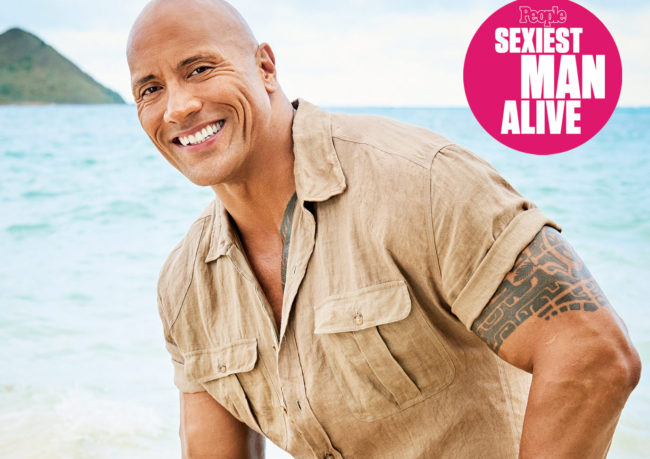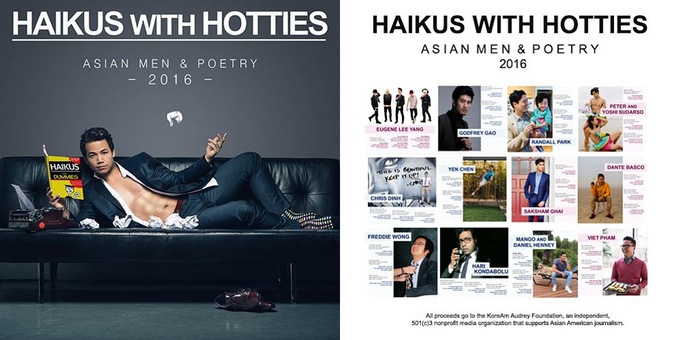
People magazine announced today that Dwayne “The Rock” Johnson has been crowned 2016’s “Sexiest Man Alive.” Johnson is a former college football player turned WWE wrestler turned Hollywood leading man. He is mixed race Black and Samoan, making him the first Pacific Islander American to be named People‘s Sexiest Man Alive.
Johnson is also only the second Black man (after Denzel Washington, who was named Sexiest Man in 1996) and the second AAPI man (after Keanu Reeves, who was retroactively named 1994’s Sexiest Man Alive in 2015) to receive the title.
Johnson is currently on a promotional tour for Disney’s Moana, which opens next week and which features the studio’s first Pacific Islander princess. Moana tells the story of the titular daughter of a Polynesian tribal chief who sets off on a quest to save her people. Johnson voices Maui, a heroic demigod inspired by the legendary Maui, a figure whose tales are common throughout many Pacific Islander cultures. While Disney has been hailed for casting two Native Hawaiian or Pacific Islander actors — Johnson and newcomer Auli’i Cravalho — to voice the film’s main characters, the film has also faced backlash from some Pacific Islander advocates who took issue with the depiction of Maui as “overweight,” “appropriative,” and “frivolous“.
Disney was also heavily criticized for its sale of a child’s Halloween costume, which was akin to brownface. The costume was primarily was a one-piece brown-skinned suit with attached grass skirt and necklace. After community outcry, Disney pulled the costume from its shelves.
Nonetheless, many are praising Moana for the strength of its female main character. Like Brave‘s Merida, Moana joins Disney’s roster of princesses while expressing few of the trappings of the Disney cliche. She is a strong heroine whose quest revolves around saving her world rather than winning the heart of a love interest. Johnson has also received critical praise for his performance in the film.
In reaction to being named People‘s Sexiest Man this year, Johnson reflected upon what it meant for him as someone growing up as an American Samoan in Hawaii. Reports People:
“I said, ‘That’s awesome.’ And then what went through my mind was just how cool and exciting it is,” Johnson tells PEOPLE in this week’s cover story. “And then I thought, ‘Wow, we’ve pretty much reached the pinnacle.’ I’m not quite too sure where we go from here. I’ve done it all, this is it.”
…At 6’5″ and 245 lbs., the Herculean star insists that becoming comfortable in his own skin “took a lot of time.”
As a teen growing up in Hawaii, “I was doing a lot of things that I shouldn’t have. I was getting arrested multiple times, but at the same time, always very respectful to my teachers and elders. I was unsure of who I was and who I wanted to be,” he says.
AAPI men have long endured racialized gender stereotypes that disparage their masculine identity. Orientalist tropes informed by model minority stereotypes falsely portray many Asian American men as uniformly ’emasculated’ (read this for an important note on such linguistic framing) relative to White men, while portrayals of Pacific Islander masculinity lack reference to the model minority myth and often include more stereotypically ‘hypermasculine’ traits. Overall, such unsophisticated and generalizing images of AAPI masculinity persist due to a shared lack of nuance and diversity in our mainstream construction of the masculine which typically reserves access to normative and sexy manhood only for White straight men. Many AAPI gender activists seek to correct this problem by diversifying our media images of masculinity so that they are more inclusive of men of colour and other marginalized men, while they also acknowledge feminist critiques of hegemonic masculinity.
Johnson ruminated on the qualities that comprise male sexiness including some traits he felt might have lead to him receiving the honour, saying:
“Ah, a sense of humor. And I think probably just not trying to be sexy and just being cool and confident in your movies. I think with a lot of my fans, I’ve gotten to a very, very cool place where there’s a direct line between the man they know off-screen and the man they see on-screen.”
People‘s Sexiest Man Alive feature has long been dominated by White heterosexual male recipients, including some (White) actors named multiple times in the feature’s three decade history. While non-White men have appeared lower in the list’s rankings, only three men of colour — Johnson, Reeves and Washington — have received the pinnacle honour of being the year’s Sexiest Man Alive for the magazine. One can only hope that the naming of Dwayne Johnson as 2016’s image of male sexiness by People will serve as a necessary step towards helping to dismantle the overarching anti-AAPI stereotypes that continue to insult the masculine and heterosexual self-image of straight AAPI men, and that it will usher in a broader and necessary diversification of hegemonic masculinity.
After all, there is no shortage of hot AAPI men. If you want more, check out Haikus on Hotties, a fantastic 2017 wall calendar featuring… well, pretty much what it sounds like. Haikus on Hotties is the second iteration of last year’s Haikus with Hotties calendar.

People‘s announcement marks a noteworthy mainstream recognition of AAPI male sexiness that is sure to be much-celebrated for the AAPI community in the coming days. I furthermore hope that this marks a new trend for People in finally starting to consider more non-White men in general for the position of Sexiest Man Alive in future years.
Update: An earlier version of this post lacked a detailed discussion of the diversity of PI male portrayals in media. Many thanks to J for the critique; this post has been revised to try and do better.
